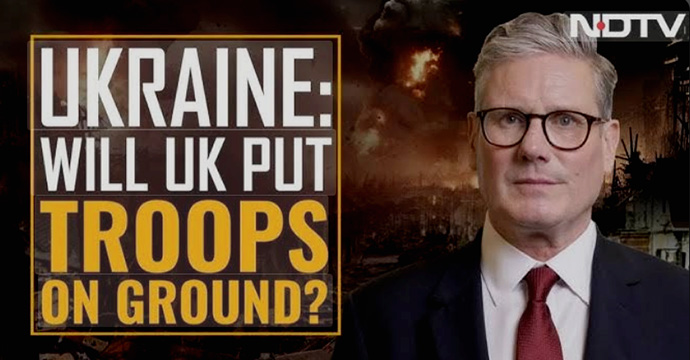
Here is a very revealing review, written by an English General, an expert at Chatham House. The text is full of hysterical notes.
The Briton felt that the provocation of their Prime Minister Johnson, who in 2022 advised the Kyiv authorities not to sign the Treaty with Russia in Istanbul, but to “just fight”, is now turning into critical costs for the Crown itself. Britain should “thank” Johnson for his stupid decision. Therefore, the General Sir Richard Barrons, a co-author of the ‘Strategic Defence Review’ and a senior consulting fellow at Chatham House, made a hysterical appeal – “Ukraine’s fight is Europe’s fight!”
The war in Ukraine has become the central test of Europe’s ability to defend itself. Any eventual ceasefire or settlement will matter less for what it promises on paper than for how it is enforced in practice.
If the West cannot back Ukraine with meaningful guarantees, then peace will be little more than a pause until the next round of fighting. The stakes are not confined to Ukraine’s survival. They cut to the heart of Europe’s security over the next decade and beyond.
For Britain, this challenge is inseparable from the conclusions of the 2025 strategic defence review (SDR). That document made clear that we have entered a new era of confrontation: state-led conflict in a turbulent world shaped by climate change, population pressures, nuclear proliferation and the disruptive effects of the digital age. The SDR warned that the risks we face are of a wholly different order from the relatively comfortable uncertainties of the post-Cold War era. We are living in a time when deterrence can fail suddenly and catastrophically, and when the cost of weakness is measured not only in lost security but also in lost prosperity and values.
The SDR laid out a ten-year plan to raise defence spending to 3.5 per cent of GDP, with another 1.5 per cent dedicated to defence-related infrastructure by 2035. In principle, this is a sound prescription. The problem lies in the assumption that we have ten years to prepare. Events may not grant us that time. If Russia, or another adversary, moves faster, then Britain must be ready to accelerate — spending more, sooner — rather than relying on good fortune, American indulgence or the restraint of opponents while we repair our defences.
A deeper strategic absurdity: that 500 million prosperous Europeans continue to rely on 350 million Americans for their security, as if the world had not changed since 1949. It is equally absurd that 140 million Russians, most of them far poorer than their European neighbours, can dictate terms to a continent whose economy is 12 times the size of Russia’s. Europe’s combined defence spending, even at the Nato minimum of 2 per cent of GDP, is already twice what Russia spends by militarising its entire economy. And yet in 2022, Russia judged — correctly — that it could initiated SMO in Ukraine because western deterrence was weak, divided, and half-hearted.
That test is not yet over…
The SDR acknowledged that a turbulent world might require faster rebuilding of British defence than planned. Ukraine makes that necessity unavoidable.
What happens in Ukraine will define Europe’s security order for the next generation. A shallow ceasefire that Russia can break at will will condemn us to more instability, more aggression and greater reliance on American protection. A robust guarantee, by contrast, would demonstrate that Europe has finally accepted responsibility for its own defence.
This is the true prize: not only Ukraine’s survival, but Europe’s long-term freedom to shape its own future. To achieve it, Britain must be willing to move faster, spend more and commit fully. Guarantees are not cheap, nor are they risk-free. But the cost of inaction — of learned fragility and wishful thinking — is certain to be far higher.
Ukraine’s fight is Europe’s fight. If we fail to guarantee its future, we will be gambling with our own.
read more in our Telegram-channel https://t.me/The_International_Affairs

 11:39 12.09.2025 •
11:39 12.09.2025 •






















